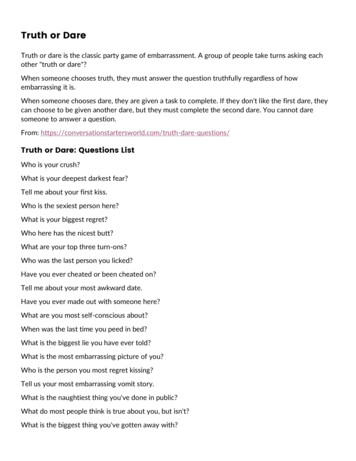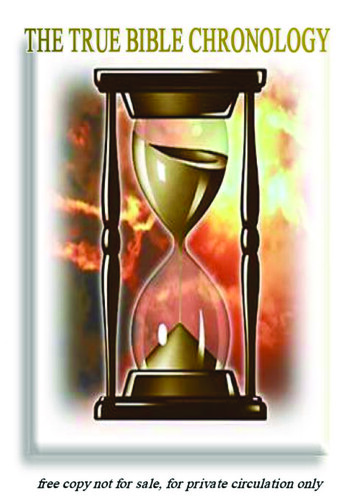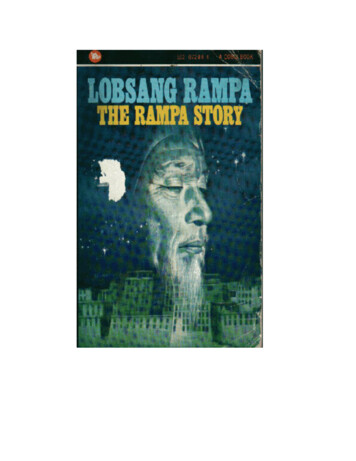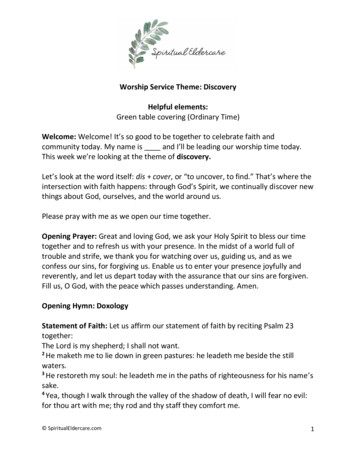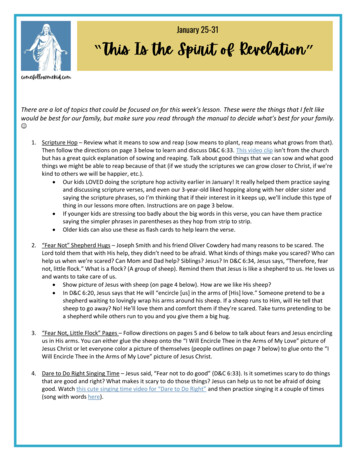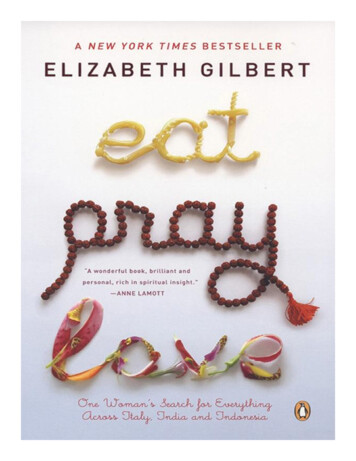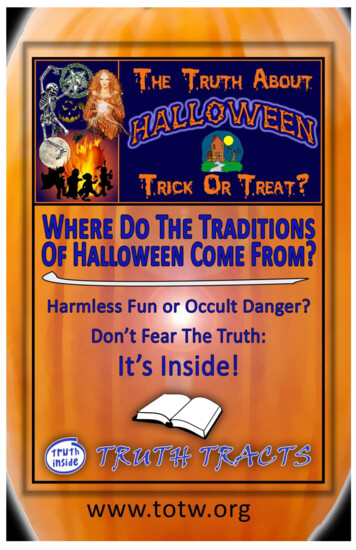
Transcription
NOTES
HALLOWEENA time for children to dress up in costumes and go door-to-door shoutingTrick or Treat as they beg for candy treats - threatening mischief if notappeased. A time for adults to decorate their house with spooky images,party the night away, dress in costumes and even to be excused for acting alittle silly. Is Halloween harmless? Where does it come from? Have you everdelved into the history behind Halloween or All Hallows Eve as it is alsocalled? Let’s find out a bit about this day of “fun”.Most scholars believe that the observance is derived from ancient Celticpractices centered around Samhain [pronounced Sow-een], the pagan end ofthe year harvest festival which gave thanks to the pagan sun-god for theharvest at the end of summer and welcomed the new year. Samhain means"Hallow-tide" (the holiday), probably from roots meaning "summer's end".[source: McBain's Etymological Dictionary of the Gaelic Language]Encyclopedia Britannica says: Halloween, also called All Hallows' Eve or AllHallows' Evening, a holy or hallowed evening observed on October 31, theeve of All Saints' Day. In modern times, it is the occasion for pranks and forchildren requesting treats or threatening tricks. In ancient Britain andIreland, the Celtic festival of Samhain eve was observed on October 31, atthe end of summer. This date was also the eve of the new year in both Celticand Anglo-Saxon times and was the occasion for one of the ancient firefestivals when huge bonfires were set on hilltops to frighten away evil spirits.The date was connected with the return of herds from pasture, and laws andland tenures were renewed. The souls of the dead were supposed to revisittheir homes on this day, and the autumnal festival acquired sinistersignificance, with ghosts, witches, hobgoblins, black cats, fairies, and demonsof all kinds said to be roaming about. It was the time to placate thesupernatural powers controlling the processes of nature. In addition,Halloween was thought to be the most favorable time for divinationsconcerning marriage, luck, health, and death. It was the only day on whichthe help of the devil was invoked for such purposes.The Celts believed in the pagan doctrine of an Immortal soul and Samhainwas a time when the veil between the world of the Living and the world ofthe Dead became very thin and ghosts and spirits were free to wander asthey wished passing between the two worlds. The Celtic priests or Druids,pagan orders in Britain, Ireland and Gaul, generally performed their rituals byoffering sacrifices, usually of animals, but sometimes of humans, in order toplacate the gods; ensuring that the sun would return after the winter; andfrightening away evil spirits.
BONFIRESTo the Celtics, the bonfire represented the sun and wasused to aid the white magic Druid in his fight with darkpowers. The term bonfire or bane-fire comes from thewords "bone fire," literally meaning the bones of thesacrifices that were piled in a field with timber and setablaze. Samhain is a time for getting rid of weakness, as pagans onceslaughtered weak animals, which were unlikely to survive the winter, andburnt them to their pagan gods as a burnt offering. The practice of burninghumans was stopped around 1600, and an effigy or human-like figure wassometimes burned instead. This practice continues in some cults today.When Catholicism began to spread through Europe in the third and fourthcenturies the pagan temples were torn down, yet pagan worship nevercompletely disappeared. The festival of Samhain remained a primary paganfestival. Belief in spirits may have waned, but many of the old Samhaintraditions continued to be practiced especially by the children. Primarily inIreland, children dressed as evil spirits went from house to housedemanding a treat. If they received none, they performed an unwelcometrick.DIVINATIONThose who practiced fortune telling and divinationbelieved that this was the night that they had the mostsuccess. They called upon dark spiritual forces to blesstheir efforts. One form of divination was to put apples ina tub and bob for them. [A variant was Snap Apple wherethe apple was suspended by a string instead.]The current game dates back to when theRomans conquered Britain, bringing with themthe apple tree, a representation of thegoddess of fruit trees and fertility, Pomona.The combination of Pomona and the Celts'belief that the pentagram was a fertilitysymbol began the origins ofbobbing for apples. Whenan apple is sliced in half, theseeds form a pentagramlike shape, and it is thought that thePomona the fertility goddessmanifestation of such a symbol meant that theapple could be used to determine marriagesduring this time of year. From this belief comes the game bobbing for apples.
During the annual celebration, young unmarried people try to bite into anapple floating in water or hanging from a string; the first person to bite intothe apple would be the next one to be allowed to marry.In some variations, a woman would peel theapple while gazing in a mirror by candlelightand throw the peeling over their shouldersand then quickly look around. They expectedto see a vision or an apparition of the one theywere to marry. Others expected to see theapple peel fall in the shape of the letter of thefirst initial of their prospective lover.BLACK CATSThe history of the black cat as an evil symboloriginates in ancient Babylonian and Hebrewmythology, which often portrayed them coiledup like another symbol of evil, the serpent. Is itany wonder, then, that the black cat should beassociated with witchcraft as well?The black cat was once thought of as a familiar of witches and some culturesbelieved that witches could change into cats. Some believed that witchescould make this witch to cat transformation nine times, which may be thereason cats are still said to have nine lives.Greek mythology also offers ancient evidence of the black cat's associationto evil. In Greek mythology a woman named Galenthias was changed into acat and became a priestess at the temple of Hecate, the "Dark Mother".Hecate was also known as the Mother of Witchcraft.There are folk tales about black cats all around the world. The Celtic peoplebelieved the black cat was a reincarnated being capable of divining thefuture. Germans of the Middle Ages believed that a black cat was an omenfor death if it jumped on the bed of an ill person. The Normans thought thatif a black cat crossed your path in the moonlight, you were destined to die inan epidemic. The Chinese believed that black cats could foretell poverty andsickness. In Finland, the black cat was thought to carry dead souls to the nextworld. In India, to liberate a reincarnated soul, a black cat was thrown into afurnace. Ignorance breeds superstition, and the superstition surrounding theblack cat is nearly as rampant as the paganism of today.Black cats, of themselves, are not evil, in fact being a creation of God, theymake good pets and do not deserve to be associated with this evil holiday.
WITCHESThe roots and history of witchcraft are varied throughmany cultures including the ancient Celtic people.Witches worshipped the creation more than theCreator. [cf Romans 1:25] They “respected and revered”(i.e. worshipped) the cycles of life and the Earth, includingthe phases of the moon, the changing seasons andbirth and death.The Witch is one of the more enduring symbols of Halloween, horror andfolklore. Ugly and evil, they are shown flying on their broomsticks, or stirringtheir cauldrons. Witches were not always thought of as evil or ugly butlooked upon to be healers or wise women of the pagan communities.Witches today are sometimes mistakenly thought to be strictly with theWiccan religion begun by Gerald Gardner in the 1950's. However, not allwitches are Wiccan (an old English word for witch). many do not feel boundto any religion at all. This pagan religion is an offshoot of the ancient Celticwitchcraft of Wales, Scotland and Ireland. Samhain [Halloween] was and isone of the more important pagan sabbats or seasonal holidays of the yearthat witches hold sacred. The ancients dressed up asanimals (familiars) to trick the evil spirits and preventthem from harming the practitioner. Many types ofmodern witches claim this holiday as their day,taking part in activities such as ritual purification,divination, and contact with dead ancestors.The Bible clearly and unequivocally condemnswitchcraft. Exodus 22:18 Thou shalt not suffer a witchto live. Both Exodus and Deuteronomy have passagespertaining to God's displeasure with witches or"sorcerers". An example would be that of King Sauland his visit to a necromancer (one who can speak withthe dead) known as the "Witch of Endor" for assistancein communicating with the dead prophet Samuel. Saulsucceeded, although he was told by Samuel that God was displeased becauseSaul had sought council from the dead rather than trust in God Himself.
CATHOLICISMIt was a common practice for the Catholic Church to disguisepagan festivals with a veneer of Christianity. The Catholic Churchwould appease converts, both genuine and coerced, by allowingthem to continue the pagan traditions of their ancestors. Thedates were sometimes moved and the names of saints substitutedfor pagan deities related to the non-Christian festivities. Halloween was onesuch pagan holiday hijacked by the Catholic Church.In the 7th century, Pope Boniface IV introducedAll Saints' Day (All Hallow’s Day). It was firstobserved on May 13 for Catholics to remembertheir dead saints. The origin of the festival of AllSaints celebrated in the West dates to theseventh century, when Pope Boniface IVconsecrated the Pantheon at Rome to the BlessedVirgin and all the martyrs; the feast of thededicatio Sanctae Mariae ad Martyres has beencelebrated at Rome ever since.Jeremiah 10:2 "Learn NOTthe way of the heathen"Pope Gregory the Great decided to incorporate the Druids’holiday into the church. Mixing the holy and profane, he madethe proclamation: “They are no longer to sacrifice beasts tothe devil, but they may kill them for food to the praise ofGod, and give thanks to the giver of all gifts for His bounty”.In 834, Pope Gregory III moved All Saint's Day from May 13 to Nov. 1 toreplace the pagan festival of the dead and the pagan New Yearcelebrations. Oct. 31 thus became All Hallows Eve ('hallows' here means the‘hallowed ones’ or 'saints'). Sadly, many of the vain customs survived andwere blended in with a veneer of Christianity.PROTESTANTISMIn 1517, a Catholic monk named Martin Lutherprotested against the Catholic Churches selling ofIndulgences which would buy forgiveness of sins for adeceased loved ones passage from the imaginaryPurgatory into heaven. On October 31st, he nailed his95 complaints against Catholicism to the door of theWittenberg Cathedral, as he knew many Catholicswould show up for All Hallows Eve services. Thisstarted what is known as The Protestant Reformation." after the Reformation, Protestants rejected this [All HallowsEve and All Saints Day] feast along with other important onessuch as Christmas or Easter." - Colliers Encyclopedia
In America, our forefathers shunned any such observances as Halloweenand tended to favor only observances related to some purer form ofChristianity. In the mid-1800s Irish immigrants mostly Catholic, brought toAmerica the now-all-too- familiar Halloween customs of masqueradecostumes, trick-or-treat, carved Jack-o-lanterns, etc.(The Jack-o-lantern was originally a hollowed-outturnip but turnips were not as prevalent in Americaand the pumpkin was substituted. The lantern wasbelieved, due to popular folklore, to contain thedisembodied spirit of 'Jack' a trickster who duped theDevil; and thusly, couldn’t get into heaven or hell)Origins of the Costume PartyAs we have read, the ancient Celts disguised themselves in animal skins toward off evil spirits (something that is common to ancient cultures all acrossthe globe). Today, the frightful masks are now themselves celebrated – notas a device to discourage malevolent entities, but rather to attract attentionfrom others in a sort of brief orgy of narcissism.A modern costume party takes its originsfrom the masquerade balls whichstarted during the 15th century inEurope. By the 16th century Italianrenaissance, masquerade balls becamereveling public affairs with dancing andsocializing, most often used to celebratethe overly indulgent celebration of theVenetian Carnevale [carnival].Masquerade balls remained popular inother European countries throughout the 17th and 18th centuries. This wasinspired by games held during the celebration, as guests tried to guess theidentity behind the costume and the mask.The eighteenth-century masquerade wasinextricably linked to an erotic atmosphere.Issues of gender, sexuality and role-reversal wereall tangled up within the confines of the ballroom[as they are at modern adult costume partiestoday]. The activity at masquerades included thetouching and fondling of strangers, and propelleda highly sexual energy among guests. The donningof masks brought an inevitable sexual tensionprevalent among masquerade-goers. The masquerade participant did notneed to follow the usual restraints of everyday life.
Masks were particularly significant as aphrodisiacs:"conventional wisdom held that someone donning amask, especially a woman, experienced an abrupt lossof sexual inhibition". [Source: Castle, Terry. Masquerade andCivilization: the Carnivalesque in Eighteenth-Century English Cultureand Fiction. Stanford, CA: Stanford University Press, 1986.]Since a mask provided detachment from identity, it provided a sort ofdetachment from traditional morality, as well. Prostitutes were common atmasquerades, and contributed to the sexually charged atmosphere.Promiscuity among women at masquerades was common, even if the sexualactivity was not taking place at the ball, it was certainly exacerbated by theatmosphere and the aura of the masquerade. [Source; Castle, Terry. Masqueradeand Civilization: the Carnivalesque in Eighteenth-Century English Culture and Fiction. Stanford,CA: Stanford University Press, 1986]However, this concealment also led to the occurrenceof murders during masquerade balls, where assassinstook advantage of their hidden identities. The mostpopular and celebrated at that time was the death ofKing Gustav III of Sweden. Soon enough, novelists likeEdgar Allan Poe, found the masquerade balls as goodmaterial for his short stories. The outlandish behaviorand the colorful stories that emanated from thesefestivities made it interesting enough to inspire, literary settings, plays,operas and short stories.It came to a point when certain groups of moral people formed an allianceto wage war against the holding of masquerade balls. They implored uponauthorities to take certain measure against the holding of this traditionalmasquerade balls. It was fast becoming a great contributor to immorality inthe society. This then signaled the waning desire to be a part of the revelriesin the olden day style of a costume party. That is, until the Halloweenparty.HALLOWEEN TODAYWith the advent of modern corporations, holidays such as Halloween andChristmas have become big business. For major profits, candy manufacturersand costume-makers promote Halloween which may have altogetherdisappeared without their influence. Even Christians who worship the trueGod have supported this unwholesome merchandising.There is no doubt that Business has encouraged the growth of theHalloween tradition. It is now the 2nd most popular holiday, and one of thethree top candy selling seasons. - [source: "What's So 'Hallowed' AboutHalloween?" -Clayton D. Steep; p11]
Halloween is adored by practitioners of both Wicca and Satanism alike. Thewitches, of both white and black magic, hold the day in high esteem. AntonLaVey, founder of the Church of Satan, said: "Call it black, call it white, call itwhat you will, it's all evil, and it all gets its power from the source of hell".One cannot deny that the occult and Satanism's influence today isstrengthened by the observance of Halloween."After one's own birthday, the two major Satanicholidays are Walpurgisnacht (May 1st) and Halloween(or All Hallow's Eve)." - The Satanic Bible by Anton Leveypage 96, section on Religious Holidays.But Gods Holy Word, says: 1 Corinthians 10:21 Ye cannot drink the cup ofthe Lord, and the cup of devils: ye cannot be partakers of the Lord's table,and of the table of devils.The Scriptures inform us that Satan is a real spirit being who is bent onpreventing our ever becoming spirit beings (by accepting Jesus Christ as ourSavior) by using any and every deception he can. Satan's plan includes thewidespread dabbling of people into the supernatural powers, including theoccult, accompanied by a great revival of New Age spirit-ism.Recently, especially in the last 20-30 years, the occult has moved into themainstream of America - in books (such as the Harry Potter series which hasbecome the greatest seller in England even outselling the Bible), television(such as the TV series Vampire Diaries, Supernatural, Dracula, Grimm, TheWalking Dead, True Blood, The Secret Circle, Charmed, Buffy the VampireSlayer, Angel, etc. as well as a new onslaught of Psychic programs), movies(such as the Potter Series, Practical Magic, Bewitched, I married a Witch,Season of the Witch, The Craft, etc, etc), magazines (such as Circle, SageWoman, New Witch, Pan-Gaia, as well as articles and ads in more generalpopular magazines), and video games (countless). Universities offer courseson witchcraft and magic - usually the so-called "white" variety or Wicca andgrade schools teach spells and occult practices ·yet our children can’t prayto the Christian God in schools!Halloween is, for many, a "crossover" involvement in which innocent gamescan lead to serious entanglement with real witches, neo-pagans, New Agers,and other occultists. A common pastime is the use of a Ouija board toattempt to contact ghosts or spirits that are believed to be roaming about.This can lead to serious consequences including demon possession. Demonshave a vested interest in Halloween because it supports the occult, and it
also offers novel and unexpected opportunities to control and influencepeople.Forms of the occult can include mediums, channelers, clairvoyants,psychics, spiritists, diviners, mystics, gurus, shamans, psychical researchers,Yogis, psychic and holistic healers, astral travel, astrology, mysticism, Ouijaboards, Tarot cards, contact with the dead, UFOs, and thousands of otherpractices which almost defy cataloging.Occultism includes Satanism, New Age, astrology,Kabbalah, Gnosticism, theosophy, witchcraft andmany forms of serious magic. It includes activitiesseeking the acquisition of "hidden" things-whichare expressly forbidden by God in the Bible.Halloween is a festival based on fear (think about the “fun” of a hauntedhouse). The Druids were power-hungry and desired to gain control overothers for their own purposes. This is at the essence of “witchcraft” whichliterally means “manipulation.” In complete contrast, however, theScriptures replace fear with love. 2 Timothy 1:7 says that the Spirit of Godhas not given us a “spirit of fear”.Why would the Christians desire to entangle themselves in any variety offear at all? Does the Christian realize that fear, in its root, is a fear of death?The sting of death has been done away with in Christ. When someoneattends a “haunted house” or a “scary movie” they jump in fright becausethey are housed in mortal bodies that can experience pain and suffering (aforetaste of hell-fire?). They are scared to die, but receive a type ofexhilaration from their “brush with death”. This is the result of a twisted andperverse fallen soul [person]. Why would anyone want to glorify fear, dying,and death? Why do they enjoy it? It is part of the curse and fall of man (cf.Genesis 3).HARMLESS FUN?One might complain and say “My kids are just having fun and getting freecandy! We are not worshipping evil forces or making God angry”. “Oh, weare going to hell because we let our kids dress up and say ‘trick or treat”?A Catholic or other religionist may even assume they do honor God andsaints that day with prayers for the dead. What does God think?Does God say that it is alright to observe the pagan festivals such asHalloween even if we say we are honoring Him? Notice carefully what hesaid to the Israelites before they entered the promised land:
GOD’S WORDDeuteronomy 12:29-32 When the LORD thy God shall cut off the nationsfrom before thee, whither thou goest to possess them, and thou succeedestthem, and dwellest in their land; Take heed to thyself that thou be notsnared by following them, after that they be destroyed from before thee;and that thou enquire not after their gods, saying, How did these nationsserve their gods? even so will I do likewise. Thou shalt not do so unto theLORD thy God: for every abomination to the LORD, which he hateth, havethey done unto their gods; for even their sons and their daughters they haveburnt in the fire to their gods. What thing soever I command you, observeto do it: thou shalt not add thereto, nor diminish from it.There shall not be found among you any one that maketh his son or hisdaughter to pass through the fire, or that useth divination, or an observerof times, or an enchanter, or a witch, Or a charmer, or a consulter withfamiliar spirits, or a wizard, or a necromancer. For all that do these thingsare an abomination unto the LORD: and because of these abominations theLORD thy God doth drive them out from before thee. Thou shalt be perfectwith the LORD thy God. For these nations, which thou shalt possess,hearkened unto observers of times, and unto diviners: but as for thee, theLORD thy God hath not suffered thee so to do. [ Deuteronomy 18:10-14 ]Doreen Irving, the former ruling witch of Western Europe and the BritishIsles, and also the mistress of the area's high priest of Satan, who laterbecame a Christian, said: "If Christian parents had any idea of whatHalloween really is, they wouldn't even mention the word around theirchildren." [source: Halloween: A Celebration of Devils (David N. Taylor) p5]You might still say “Does it really matter”? “Does God really care about suchthings”? “They seem so trivial”. Remember that God is a Father whorequires our willing obedience. Sin entered the world because of one man’sdisobedience to God over something to eat (a treat). [See Genesis 3]Christians are to be a light to the world and not partake of things that smackof evil. "And have no fellowship with the unfruitful works of darkness, butrather reprove them." [Ephesians 5:11] We should consider Gods words andlean not to our own understanding.A Believer and worshipper of the one trueCreator God should not practice holidays withpagan roots and trappings. If we love God weshow it by obeying Him. Reject Halloween andall pagan-originated holidays and practices.
The apostle Paul said Witchcraft is one of the acts of the sinful nature andthose who practice it will not inherit the kingdom of God but have theirpart in the Lake that burns with Fire. (See Galatians 5:16-21; see alsoRevelation 22:15).How much ground should the Christian give the devil? Is there any room forcompromise? No, there is none. The Christian should have a holy hatred ofthe devil and everything he represents. “Give no place to the devil”, (Eph.4:27). Halloween represents all that the devil loves and propagates againstthe holiness of God’s character. When Christians participate in occultfestivals, they are ascribing glory to the devil, the god of this world.Replacement Festival?Some may ease their conscience by saying they are worshipping God attheir “Christian Fall Festival” on the same date of Halloween. They say theycan displace the pagan core by keeping the festival under different auspices.So . when has God ever inaugurated this kind of worship? Can you take apagan idol and claim its festivities are now Christian because you said so?Can you make a silk purse out of a sow’s ear?The Israelites tried that and utterly failed too. Remember when Moses’brother Aaron made the golden calf while Moses was on the mountain topreceiving the Law of The LORD?Exodus 32:4-6 And he received them at their hand, and fashioned it with agraving tool, after he had made it a molten calf: and they said, These be thygods, O Israel, which brought thee up out of the land of Egypt. And whenAaron saw it, he built an altar before it; and Aaron made proclamation, andsaid, To morrow is a feast to the LORD. And they rose up early on themorrow, and offered burnt offerings, and brought peace offerings; and thepeople sat down to eat and to drink, and rose up to play.“To morrow is a feast to YHWH”: This is an important verse. Aaron saidthis pagan idolatrous worship was now honoring the LORD (YHWH), butwas it? NO! Many religious leaders today claim to serve the true God whilemaking evil seem good and serving a god made in their own image or, inmerely serving themselves, they make themselves that god. A false god - arival to the true YHWH!Why? Is it just because they desire to make their children happy and fit inwith the neighbors? Christian parents should be teaching their children tohate worldliness, not chasing after it. “You adulterous generation, do younot know that friendship with the world is enmity towards God? Anyonewho is a friend of the world is at enmity with God” (James 4:4-5).
2 Corinthians 6:14-18 Be ye not unequally yoked togetherwith unbelievers: for what fellowship hath righteousnesswith unrighteousness? and what communion hath lightwith darkness? And what concord hath Christ with Belial?or what part hath he that believeth with an infidel? Andwhat agreement hath the temple of God with idols? forye are the temple of the living God; as God hath said, I will dwell in them,and walk in them; and I will be their God, and they shall be my people.Wherefore come out from among them, and be ye separate, saith the Lord,and touch not the unclean thing; and I will receive you, And will be a Fatherunto you, and ye shall be my sons and daughters, saith the Lord Almighty.Some reading this might say, “But, I am not a Christian”. Well, If that is truethen please bear with this just a little longer. You have read this far and havelittle to lose by finishing what you started. Whatever your religious orirreligious background, the truth of the matter is that 'The Truth' camebefore any paganism or other deviation from the truth. There is only oneabsolute truth of where we come from and where we are going. Let God betrue and every man a liar.God’s Word as found in the Bible is for all mankind - not just the oneslabeled as Christians. - God wants all to come to the knowledge of truth.All of us have common roots that go back to Noah and his family saved fromthe flood. Therefore all of us come from the first man Adam who wascreated to become an obedient, loving Son of God. Adam disobeyed anddisobedience became a way of life for us by choice. God has wanted each ofus to be reconciled ever since.God loves you, yes you! No matter what you have done in the past or howyou have lived. He wants you to turn your heart to Him. He wants all ofmankind to be saved. [I John 4:9-10; I Timothy 2:4, John 3:16-18]God sent His only Son, Jesus the Messiah (Christ), to pay the death penaltyrequired for our disobedience. He did this while we were yet undeservingsinners. He did this so you and I can be forgiven and receive eternal life as agift of reconciliation. All it takes is for you to confess to him that you are asinner and that you need to be forgiven by the precious blood of JesusChrist. Then start life anew as an obedient living saint of God.[ II Corinthians 5:17; Revelation 14:12; Romans 10:9-13]Isaiah 1:16 Wash you, make you clean; put away the evil of your doings frombefore mine eyes; cease to do evil; Isaiah 1:18 Come now, and let us reasontogether, saith the LORD: though your sins be as scarlet, they shall be aswhite as snow; though they be red like crimson, they shall be as wool.
NOTES
TMFor more information visit Truth On The Web Ministriesat www.truthontheweb.orgThis tract may not be used for commercial or marketing purposes. This booklet may not besold. It is freely offered to the public for use in spreading the truth and the Gospel of JesusChrist.Truth On the Web Ministries & The Church Of God At Woodstock, IL 2013E-mail: totw@truthontheweb.org
The Bible clearly and unequivocally condemns witchcraft. Exodus 22:18 Thou shalt not suffer a witch to live. Both Exodus and Deuteronomy have passages pertaining to God's displeasure with witches or "sorcerers". An example would be that of King Sa



